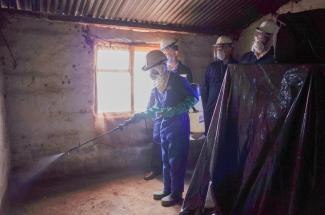Despite steady advances in the fight against malaria over the last decade, The World Health Organization’s 2018 World Malaria Report indicated that between 2017 and 2018, the global number of malaria deaths remained the same. In Zambia, thanks to the collaborative efforts of the U.S. government and Zambia’s Ministry of Health, malaria deaths continue to decline. To maintain and accelerate progress, the President’s Malaria Initiative (PMI) VectorLink Program supports the planning and implementation of Indoor Residual Spraying (IRS) campaigns and Insecticide Treated Net (ITN) programs. These are proven, life-saving vector-control initiatives, as they target the mosquitoes capable of transmitting malaria parasites.
VectorLink works closely with Zambia’s National Malaria Elimination Program (NMEP) to target 20 districts with indoor residual spraying, seven districts with entomological monitoring, and four provinces with insecticide-treated nets. Using selected entomological indicators, VectorLink will monitor the impact of the IRS operation to support decision making.
|
The indoor residual spraying campaign in 2020 sprayed over 648,000 structures, exceeding the target of 85% of all residential structures in the targeted communities and protecting over 2.7 million people. VectorLink built capacity in IRS planning, implementation and supervision at national, provincial and local levels, training over 2,500 people in IRS delivery. We anticipate a similar contribution from the 2021 IRS campaign.
The mass ITN campaign in 2020-21 is on course to deliver over 2.13 million ITNs in the four PMI-supported provinces, benefitting over 3.8 million people. We anticipate that in 2021 and 2022 VectorLink will support the distribution of 1.2 million PMI-funded ITNs through routine channels such as antenatal clinics, well-child clinics, and schools.

